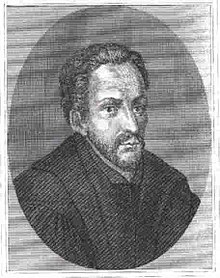Jakob Balde: Difference between revisions
migrating Persondata to Wikidata, please help, see challenges for this article |
Taylorbposey (talk | contribs) m Edited publication date of Cologne edition. |
||
| Line 5: | Line 5: | ||
Driven from [[Alsace]] by the marauding bands of [[Count Mansfeld]], he fled to [[Ingolstadt]] where he began to study law. A love disappointment, however, turned his thoughts to the church, and in 1624 he entered the [[Society of Jesus]]. Continuing his study of the humanities, he became in 1628 professor of [[rhetoric]] at [[Innsbruck]], and in 1635 at Ingolstadt, whither he had been transferred by his superiors in order to study [[theology]]. In 1633 he was ordained a priest. |
Driven from [[Alsace]] by the marauding bands of [[Count Mansfeld]], he fled to [[Ingolstadt]] where he began to study law. A love disappointment, however, turned his thoughts to the church, and in 1624 he entered the [[Society of Jesus]]. Continuing his study of the humanities, he became in 1628 professor of [[rhetoric]] at [[Innsbruck]], and in 1635 at Ingolstadt, whither he had been transferred by his superiors in order to study [[theology]]. In 1633 he was ordained a priest. |
||
His lectures and poems had now made him famous, and he was summoned to [[Munich]] where, in 1638, he became court chaplain to the elector [[Maximilian I, Elector of Bavaria|Maximilian I]]. He remained in Munich till |
His lectures and poems had now made him famous, and he was summoned to [[Munich]] where, in 1638, he became court chaplain to the elector [[Maximilian I, Elector of Bavaria|Maximilian I]]. He remained in Munich till 1660, when he went to live at [[Landshut]] and afterwards at [[Amberg]]. In 1654 he was transferred to [[Neuburg an der Donau|Neuburg on the Danube]], as court preacher and confessor to the [[count palatine]]. He remained at Neuburg for the rest of his life. |
||
A collected edition of Balde's works in 4 vols was published at [[Cologne]] in 1650; a more complete edition in 8 vols at Munich, 1729; also a good selection by L. Spach ([[Paris]] and [[Strasbourg]], 1871). An edition of his Latin lyrics appeared at Regensburg in 1884. There are translations into German of some of his odes by [[Johann Gottfried Herder]] (1795), and J. Schrott and M. Schleich ([[Munich]], 1870). See G. Westermayer, ''Jacobus Balde, sein Leben und seine Werke'' (1868); J. Bach, ''Jakob Balde'' ([[Freiburg]], 1904). Various odes have been translated into English by Karl Maurer. |
A collected edition of Balde's works in 4 vols was published at [[Cologne]] in 1650; a more complete edition in 8 vols at Munich, 1729; also a good selection by L. Spach ([[Paris]] and [[Strasbourg]], 1871). An edition of his Latin lyrics appeared at Regensburg in 1884. There are translations into German of some of his odes by [[Johann Gottfried Herder]] (1795), and J. Schrott and M. Schleich ([[Munich]], 1870). See G. Westermayer, ''Jacobus Balde, sein Leben und seine Werke'' (1868); J. Bach, ''Jakob Balde'' ([[Freiburg]], 1904). Various odes have been translated into English by Karl Maurer. |
||
Revision as of 01:07, 25 February 2016
This article includes a list of references, related reading, or external links, but its sources remain unclear because it lacks inline citations. (May 2014) |

Jakob Balde (January 4, 1604 – August 9, 1668), a German Latinist, was born at Ensisheim in Alsace.
Driven from Alsace by the marauding bands of Count Mansfeld, he fled to Ingolstadt where he began to study law. A love disappointment, however, turned his thoughts to the church, and in 1624 he entered the Society of Jesus. Continuing his study of the humanities, he became in 1628 professor of rhetoric at Innsbruck, and in 1635 at Ingolstadt, whither he had been transferred by his superiors in order to study theology. In 1633 he was ordained a priest.
His lectures and poems had now made him famous, and he was summoned to Munich where, in 1638, he became court chaplain to the elector Maximilian I. He remained in Munich till 1660, when he went to live at Landshut and afterwards at Amberg. In 1654 he was transferred to Neuburg on the Danube, as court preacher and confessor to the count palatine. He remained at Neuburg for the rest of his life.
A collected edition of Balde's works in 4 vols was published at Cologne in 1650; a more complete edition in 8 vols at Munich, 1729; also a good selection by L. Spach (Paris and Strasbourg, 1871). An edition of his Latin lyrics appeared at Regensburg in 1884. There are translations into German of some of his odes by Johann Gottfried Herder (1795), and J. Schrott and M. Schleich (Munich, 1870). See G. Westermayer, Jacobus Balde, sein Leben und seine Werke (1868); J. Bach, Jakob Balde (Freiburg, 1904). Various odes have been translated into English by Karl Maurer.
References
- Chisholm, Hugh, ed. (1911). . Encyclopædia Britannica (11th ed.). Cambridge University Press.
External links
- Works of Jakob Balde online (e.g. the Cologne edition) - project Camena
- Odes of Jakob Balde
- Herbermann, Charles, ed. (1913). . Catholic Encyclopedia. New York: Robert Appleton Company.
